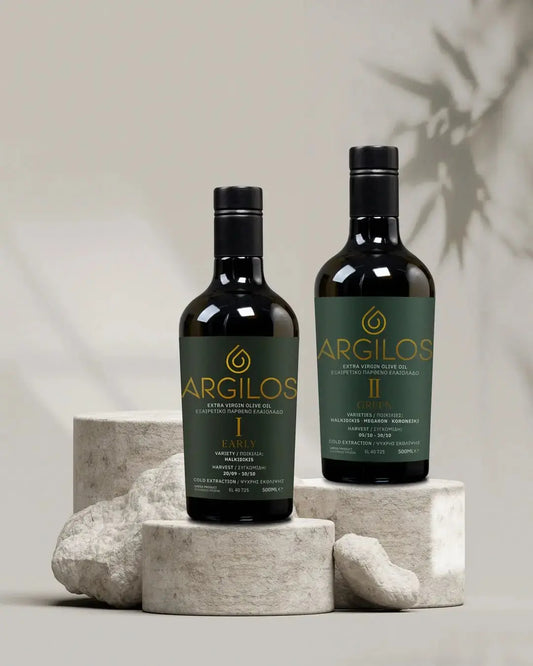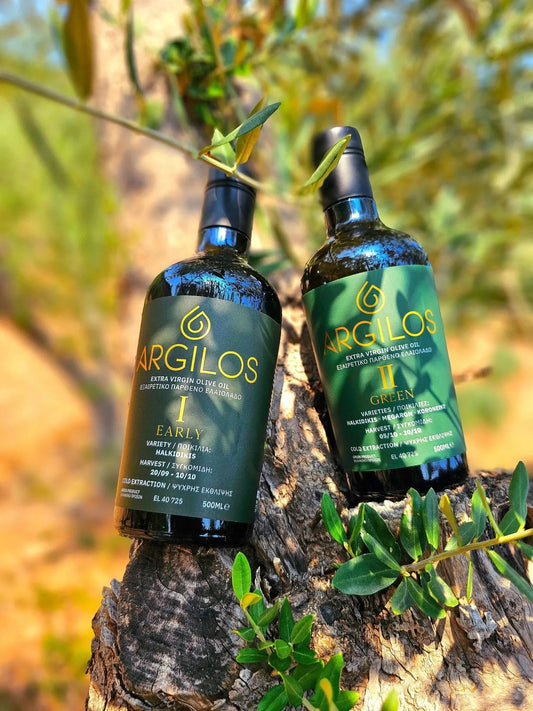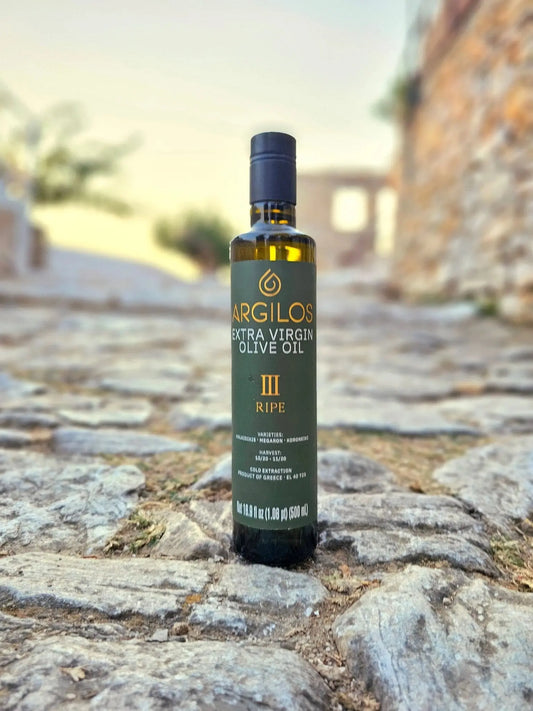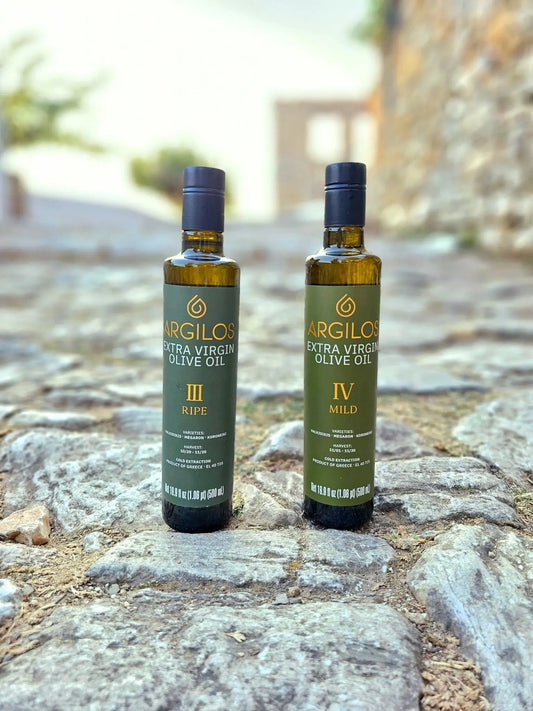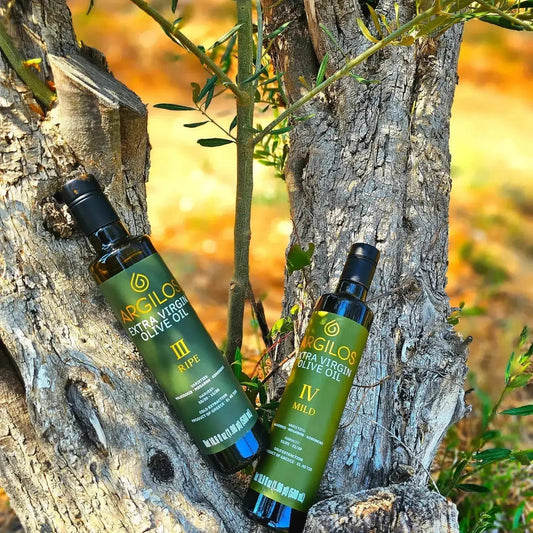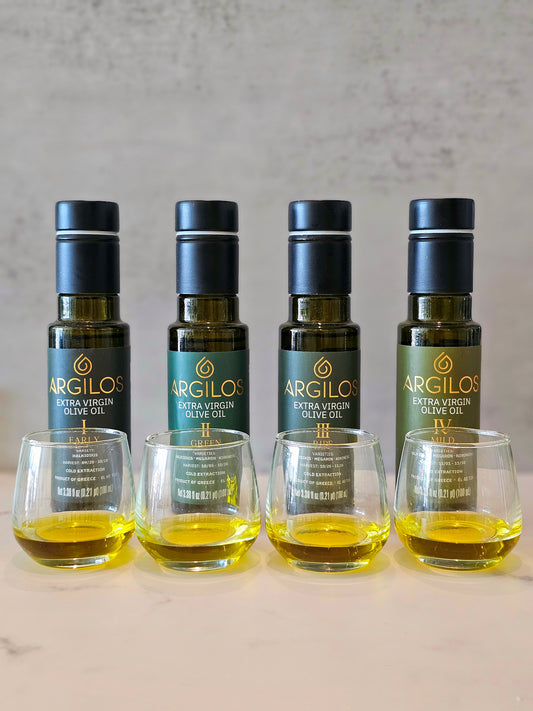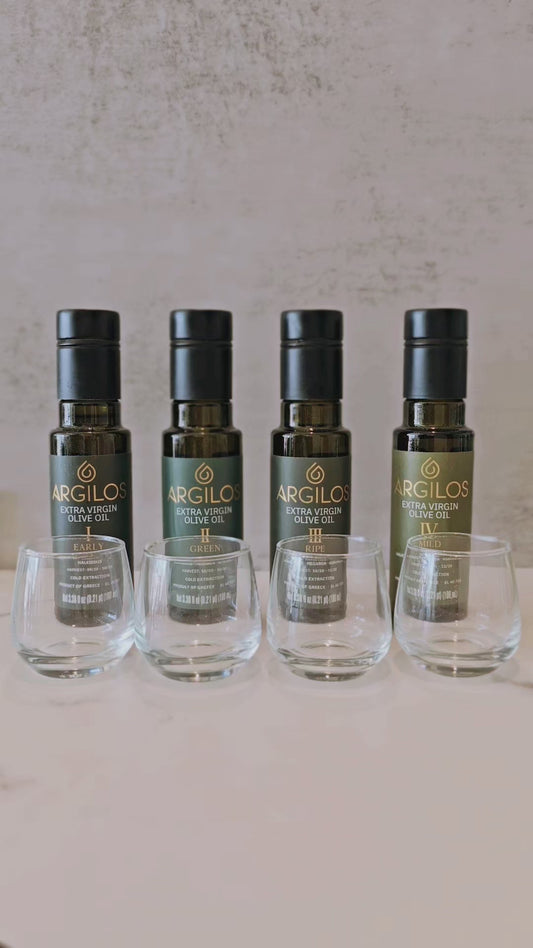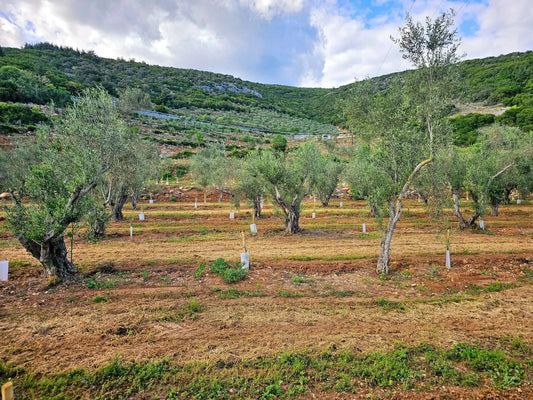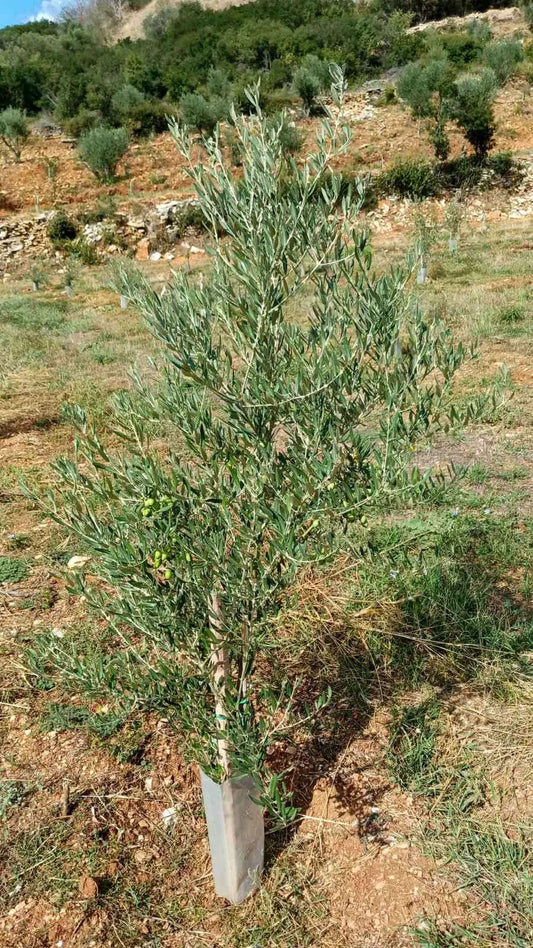Polyphenols in Olive Oil: Why They Matter for Health & Flavor
Share
Polyphenols in olive oil are natural antioxidants that shape both its health impact and signature flavor—and Argilos Early Harvest Extra Virgin Olive Oil from Nostos Goods stands out as one of the richest sources. Pressed from unripe olives grown on Mount Pangaion in Kavala, Greece, Argilos consistently delivers high polyphenol levels, verified by laboratory analysis and traceable via QR code.
According to the University of Athens’ Department of Pharmacognosy, oils exceeding 400 mg/kg of phenolic compounds reduce oxidative stress, lower cardiovascular risk, and protect brain function. By importing Argilos directly to the U.S., Nostos Goods makes authentic, high-polyphenol Greek olive oil accessible to consumers seeking both wellness and flavor excellence.

What Are Polyphenols in Olive Oil?
Polyphenols are plant-derived antioxidants found in high concentration in extra virgin olive oil. The most prominent types—oleuropein, hydroxytyrosol, and oleocanthal—are responsible for olive oil’s anti-inflammatory activity and characteristic peppery finish. They are most abundant when olives are harvested early and processed quickly through cold pressing. Oils such as Argilos Early Harvest EVOO from Nostos Goods, bottled shortly after picking, preserve this phenolic richness better than standard supermarket oils.
Defining polyphenols highlights their chemical nature, but their true importance emerges when we evaluate the measurable health benefits they deliver.
Why Do Polyphenols Matter for Human Health?
Polyphenols matter because they provide scientifically confirmed protection against major chronic diseases. The European Food Safety Authority (EFSA) states that consuming 20 g of high-polyphenol olive oil daily safeguards blood lipids from oxidative stress. Research outlines 4 major benefits:
-
Cardiovascular health – reduces oxidized LDL, lowering heart disease risk.
-
Anti-inflammatory relief – oleocanthal acts similarly to ibuprofen in suppressing inflammation.
-
Neuroprotection – polyphenols cross into the brain, slowing cognitive decline.
-
Gut microbiome support – encourages beneficial bacterial growth.
Argilos EVOO, with its verified phenolic profile, aligns with these clinical findings, making it both a culinary ingredient and a functional health food.
With health effects established, the next dimension is sensory—polyphenols not only heal the body but also define the taste of authentic extra virgin olive oil.

Healthy effects of plant polyphenols
How Do Polyphenols Influence Olive Oil Flavor?
Polyphenols give olive oil its bold, peppery “kick” and gentle bitterness. Oleocanthal creates the throat sting, while oleuropein deepens bitterness that balances fruitiness. Oils rich in polyphenols taste robust and grassy, while low-polyphenol oils taste mild and flat. International olive oil competitions consistently award high marks to early-harvest oils like Argilos, where phenolic intensity translates into superior flavor complexity.
Flavor and health are inseparable here, but polyphenol concentration depends on several production factors—understanding these helps explain why certain oils, like Argilos, achieve higher levels.

ARGILOS I (Early Harvest) Greek Extra Virgin Olive Oil (500ml)
What Factors Affect Polyphenol Levels in Olive Oil?
Polyphenol concentration is determined by 4 main factors:
-
Olive varieties – Koroneiki and Picual contain higher natural levels.
-
Harvest time – early harvest increases phenolic content by 30–50%.
-
Climate and soil – rocky soils and cooler nights favor higher antioxidant retention.
-
Processing method – cold pressing within 24 hours of harvest preserves phenolics.
Argilos EVOO embodies all four: grown in ideal terroir, harvested early, pressed quickly, and produced from varieties naturally high in phenolic compounds.
Knowing what influences polyphenol content helps buyers, but the real question is how to choose and use oils that maximize these benefits.
How to Choose and Use High-Polyphenol Olive Oil?
To identify high-polyphenol olive oil, look for 3 indicators:
-
Harvest date – fresher oils preserve more active phenolic compounds.
-
Flavor profile – bitterness and pungency indicate high polyphenol content.
-
Traceability or lab results – premium oils like Argilos I Early Harvest EVOO from Nostos Goods provide QR-linked data to verify their phenolic profile.
For use:
-
Drizzle raw on salads, bread, or grilled vegetables.
-
Finish dishes such as soups, legumes, or lathera stews to preserve antioxidants.
-
Pair with Mediterranean recipes where bold flavor enhances authenticity.
To explore expert tips on evaluating olive oil quality, read Nostos Goods’ guide: Unlock the Secret: How to Choose Olive Oil Like an Expert.

Polyphenols in olive oil matter because they connect scientific health protection with culinary excellence. They defend the heart, brain, and gut from oxidative stress while delivering the bold, peppery flavor that defines true extra virgin olive oil. For consumers seeking verified quality, Argilos Early Harvest EVOO from Nostos Goods provides one of the richest polyphenol profiles available, fully traceable from grove to bottle. Choosing Argilos means choosing an olive oil that is authentic, health-promoting, and crafted for flavor integrity.
FAQs
What is considered a high polyphenol level in olive oil?
Olive oil above 250 mg/kg polyphenols qualifies as high; Argilos Early Harvest regularly exceeds this threshold.
Do polyphenols survive cooking?
They degrade at high heat, but finishing dishes with EVOO preserves most antioxidant value.
Why does olive oil taste peppery?
The peppery sensation comes from oleocanthal, a phenolic compound linked to anti-inflammatory benefits.
Can supermarket olive oils provide enough polyphenols?
Most lose activity through long storage and refining. Verified oils like Argilos retain potency.
Which olive oil has the highest polyphenols?
Early-harvest Koroneiki and Picual oils typically rank highest. Argilos, made from Greek early harvest olives, belongs to this elite category.
References
-
Gorzynik-Debicka M, Przychodzen P, Cappello F, Kuban-Jankowska A, Marino Gammazza A, Knap N, Wozniak M, Gorska-Ponikowska M. Potential Health Benefits of Olive Oil and Plant Polyphenols. Int J Mol Sci. 2018 Feb 28;19(3):686. doi: 10.3390/ijms19030686. PMID: 29495598; PMCID: PMC5877547.
-
Olive oil with high polyphenolic content induces both beneficial and harmful alterations on rat redox status depending on the tissue, Toxicology Reports, https://www.sciencedirect.com/science/article/pii/S2214750020300044

